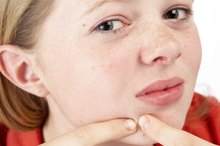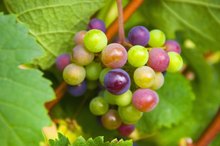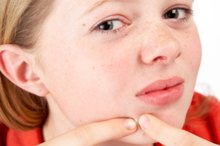Kidney Beans & Acne
According to the American Academy of Dermatology, total costs of treating acne exceeded 2 billion dollars in 2004 1. If you have acne, talk to a dermatologist to see what treatment options are appropriate for you. Making certain modifications to your diet can also reduce the severity of acne. Kidney beans may be one diet addition that can help combat acne.
Background
Non-dietary risk factors for acne include family history, use of oily cosmetics and hormonal changes that take place during puberty, the University of Maryland Medical Center reports. A paper published in the June 2005 issue of "Seminars in Cutaneous Medicine and Surgery" notes that diet plays an important role in acne. In particular, a diet devoid of zinc and a diet rich in fast-digesting carbohydrates may aggravate acne in certain people.
Zinc
Are Brown Rice and Sweet Potatoes Good for Acne?
Learn More
Kidney beans are a plentiful source of the mineral zinc. Zinc is an essential mineral that plays a role in the formation of healthy skin. Additionally, zinc is involved in the functioning of sebaceous glands that produce sweat. Overactive sebaceous glands can cause acne, a May 2007 paper published in the ""Turkish Academy of Dermatology" reports 1. In this study a group of volunteers with and without acne were tested for zinc levels in the blood. The researchers found that those with low blood zinc levels were nearly five times as likely to have acne when compared to those with normal zinc levels.
- Kidney beans are a plentiful source of the mineral zinc.
- Additionally, zinc is involved in the functioning of sebaceous glands that produce sweat.
Glycemic Load
The glycemic load indicates how quickly a food is converted to blood sugar by your body. Kidney beans are a low-glycemic food, Harvard University Medical School reports. In a study published in the July 2007 "American Journal of Clinical Nutrition," a group of acne sufferers were asked to consume a fibrous, low-glycemic diet 1. The researchers found that following this diet over the course of 12 weeks reduced acne severity by approximately 25 percent.
- The glycemic load indicates how quickly a food is converted to blood sugar by your body.
- In a study published in the July 2007 "American Journal of Clinical Nutrition," a group of acne sufferers were asked to consume a fibrous, low-glycemic diet 1.
Folic Acid
7-Day Detox Treatment for Acne
Learn More
Folic acid is an essential B-vitamin that's important for the creation of new skin cells. Regular production of new skin cells can clear pores and reduce the risk of acne breakouts. Kidney beans are rich in folic acid. A single-cup serving of cooked kidney beans contains more than 100 percent of your daily value for folic acid, the USDA Nutrient Database reports.
- Folic acid is an essential B-vitamin that's important for the creation of new skin cells.
- A single-cup serving of cooked kidney beans contains more than 100 percent of your daily value for folic acid, the USDA Nutrient Database reports.
Related Articles
References
- American Academy of Dermatology: Acne
- "Earl Mindell's Vitamin Bible for the 21st Century;" Earl Mindell, R.P.H., Ph.D.; 1999
- American Academy of Dermatology. Acne: Who gets and causes.
- American Academy of Dermatology. Adult acne.
- Zaenglein AL, Pathy AL, Schlosser BJ, Alikhan A, Baldwin HE, Berson, DS, et al. Guidelines of care for the management of acne vulgaris. J Am Acad Dermatol. 2016;74(5):945-73.e33. doi:10.1016/j.jaad.2015.12.037
- Ju Q, Tao T, Hu T, Karadağ AS, Al-khuzaei S, Chen W. Sex hormones and acne. Clin Dermatol. 2017;35(2):130-137. doi:10.1016/j.clindermatol.2016.10.004
- Dréno B. What is new in the pathophysiology of acne, an overview. J Eur Acad Dermatol Venereol. 2017;31 Suppl 5:8-12. doi:10.1111/jdv.14374
- Juhl CR, Bergholdt HKM, Miller IM, Jemec GBE, Kanters JK, Ellervik C. Dairy intake and acne vulgaris: A systematic review and meta-analysis of 78,529 children, adolescents, and young adults. Nutrients. 2018;10(8) doi: 10.3390/nu10081049
Resources
Writer Bio
Ryan Devon is a registered dietitian with a Master of Science in nutrition and health promotion from Simmons College. He starting writing in 2010, specializing in weight management and eating-disorder science.









